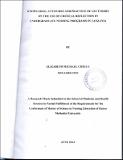Knowledge,attitude and practice of lecturers on the use of critical reflection in undergraduate nursing programs in Tanzania

View/
Date
2014-06Author
Chigua, Elizabeth Michael
Type
ThesisLanguage
enMetadata
Show full item recordAbstract
Critical reflection is a teaching strategy adopted by many countries for training undergraduate nursing students. The strategy is accepted and institutionalized within e nursing profession worldwide. In higher nursing education, critical reflection offers a way for practitioners to gain insight into the nursing practice. The purpose of this study was to investigate the knowledge, attitudes, and practice of lecturers on the use of critical reflection in undergraduate nursing programs in Tanzania. A descriptive cross-sectional design was used for the study, whereas the target population included lecturers in all schools in Universities offering the undergraduate nursing programs in Tanzania. Census approach was used, in that, all the lecturers’ were used as subjects. A total of 65 (92.85%) of the lecturers participated in the study. Self-administered questionnaire and observational checklist were the tools used for data collection. Data collection was done by the researcher after ethical clearance by the Kenya Methodist University, including other respective authorities in Tanzania. Collected data were organized, sorted, coded and analyzed by using Microsoft Excel and SPSS version 16.0 computer software. Both Quantitative and qualitative approaches were used in the data analysis with the results presented in tables and figures. The findings revealed that 39 (60.00%) of the lecturers had adequate knowledge on critical reflection, an average of 53 (81.53%) of the lecturers held positive attitude towards critical reflection, 43 (66.15%) of the lecturers were practicing critical reflection although not in totality, and 43 (66.15%) of the lecturers had adequate institutional support to practice critical reflection. However, 45 (69.23%) of the lecturers felt that they were less competent using critical reflection while 8 (12.31%) felt that they were not competent at all in using critical reflection. As critical reflection was not emphasized in the current nursing training curriculum, institutional support to push the practice of critical reflection was also lacking to some extent. From this point of view, this study recommended that the Ministry of Health and Social Welfare in Tanzania should incorporate the critical reflection into the nursing training curriculum.
Publisher
KeMU
Description
RT 81.5.C3 2014
